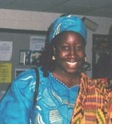Project Year
2011
Region(s)
West Africa
Country(ies)
Ghana
Project Description
This study will evaluate the impact of mobile banking products on the financial behaviors of Ghana’s urban poor one year after their introduction into the country. With the use of semi-structured interviews and a document review, we propose to investigate the cultural perceptions of the use of mobile money(MM), identify its successes, as well as any barriers to its adoption, and ultimately, its impact on Ghana’s urban poor with respect to their access to financial resources, attitude toward saving, storage and wealth transfer.
Researcher(s)
Vivian Afi Dzokoto, Edwin Clifford Mensah
About the Researcher(s)
 Dr. Vivian Afi Dzokoto received her Ph.D. in Clinical Psychology from the University of Illinois at Urbana
Champaign. Currently an Assistant Professor in African American Studies at Virginia
Commonwealth University, Dr. Dzokoto’s current research interests include culture
and emotion, and redenomination experiences in Ghana.
Dr. Vivian Afi Dzokoto received her Ph.D. in Clinical Psychology from the University of Illinois at Urbana
Champaign. Currently an Assistant Professor in African American Studies at Virginia
Commonwealth University, Dr. Dzokoto’s current research interests include culture
and emotion, and redenomination experiences in Ghana.
 Dr. Edwin Clifford Mensah, received his Master of Economics and Ph.D. in Economics degrees from North Carolina
State University and is currently an Assistant Professor of Economics in the School
of Business at the University of North Carolina at Pembroke, U.S.A. He is also a
visiting Professor of Economics at Valley View University-Ghana (West Africa). He
is the author of the book, Economics of Technology Adoption: A Simple Approach, and
a number of peer reviewed journal publications.
Dr. Edwin Clifford Mensah, received his Master of Economics and Ph.D. in Economics degrees from North Carolina
State University and is currently an Assistant Professor of Economics in the School
of Business at the University of North Carolina at Pembroke, U.S.A. He is also a
visiting Professor of Economics at Valley View University-Ghana (West Africa). He
is the author of the book, Economics of Technology Adoption: A Simple Approach, and
a number of peer reviewed journal publications.
Synopsis of Research Results
This study evaluated the impact of mobile banking products on the financial behaviors of Ghana’s urban poor in 201, one year after their re-introduction into the country. With the use of semi-structured interviews and a document review, customer awareness of mobile money, perceived usefulness and trust of mobile money, and barriers to mobile money adoption were explored in low and high income residents of Accra, as well as market women and high end merchants.
In general, interest in adopting mobile money as a means of conducting financial transactions was very low. Less than 5% of interviewees reported having ever used MM. Barriers to mobile money use in Ghana included low awareness, understanding, and trust of mobile money, despite the recognized advantages of mobile money over other forms of money, and the hassles involved in dealing with banks and other avenues of money transfer. Cash was the preferred medium for financial transactions.
Low income interviewees were less knowledgeable about MM than the rest of the sample, indicating that so far, information about MM has not been effectively reaching low income segments of the Ghanaian population. While MM marketing in Ghana has been conducted mostly through radio and television ads, print media and billboards, many respondents indicated a preference for person-to-person marketing.
View slidedeck, "Does Mobile Money Matter? Exploring Mobile Money Adoption by Ghana’s Urban Poor" presented at IMTFI Conference midway through the research project on December 7, 2011.



